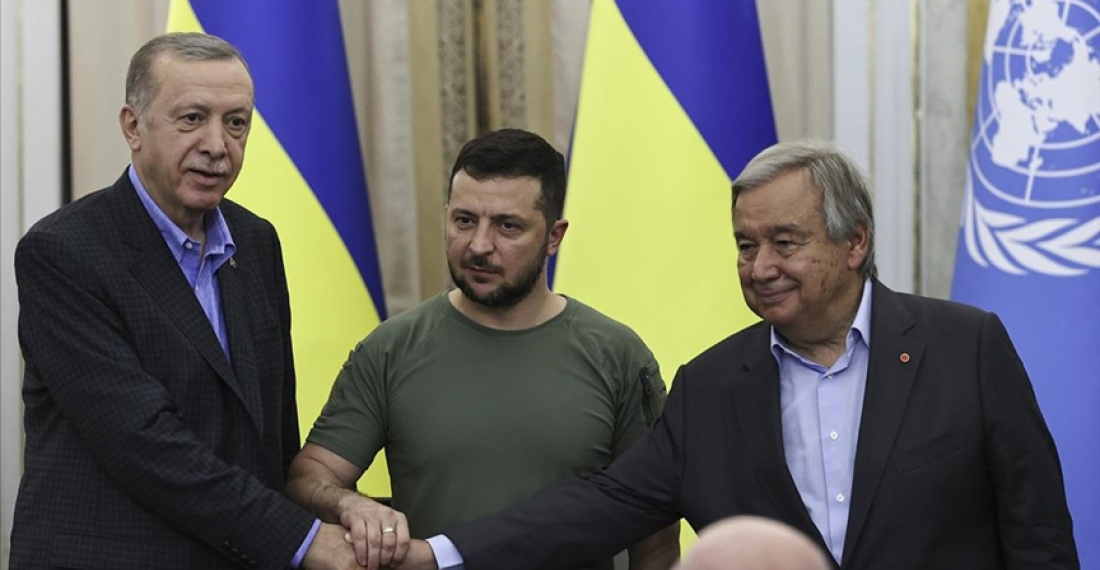The visit of Turkish president Recip Tayip Erdogan and UN Secretary General, Antoniuo Gutteres, to Lviv on Thursday once more opened the possibility of negotiations between Ukraine and Russia. However a lot of the discussions were focused on the more immediate issue of the Zaporizhzhia nuclear plant,
Ukrainian President Volodymyr Zelenskyy says he has agreed to the parameters of a potential mission of the International Atomic Energy Agency to the Zaporizhzhia nuclear plant, after repeated shelling of the complex raised fears of a nuclear catastrophe..
Speaking at a news conference in Lviv on Thursday following a trilateral meeting with the Turkish president and the UN secretary-general, Zelenskyy said “only absolute transparency and control of the situation” by the UN’s International Atomic Energy Agency (IAEA), among other bodies, could guarantee nuclear safety.
It was not immediately clear if Russia would agree to the parameters.
The Ukrainian leader also reiterated a call for Russia to immediately withdraw its forces from the nuclear power plant in southern Ukraine and stop all military activity in the area.
Concerns about the plant mounted on Thursday when Russian and Ukrainian authorities accused each other of plotting to attack the site and then blame the other side.
Kyiv and Moscow have accused each other of multiple recent incidents of shelling at Europe’s largest nuclear power plant, which Russian troops captured early in the war.
Turkey’s President Recep Tayyip Erdogan expressed worry about the flare-up of military activity in Zaporizhzhia. “We don’t want another Chernobyl,” he said.
UN chief Antonio Guterres also expressed grave concern about the situation at the plant and said it had to be demilitarised. “We must tell it like it is — any potential damage to Zaporizhzhia is suicide,” he said.
The secretary-general also called for the demilitarisation of the area around the vast nuclear power plant. “The facility must not be used as part of any military operation. Instead, agreement is urgently needed to re-establish Zaporizhzhia’s purely civilian infrastructure and to ensure the safety of the area,” he said.
IAEA chief Rafael Mariano Grossi repeatedly called on both warring sides to cooperate in order to allow his agency to conduct a fact-finding mission and verify the plant’s safety.
Erdogan, who was on his first visit to Ukraine since Russia invaded on February 24, insisted the war should be resolved through diplomatic channels and renewed his offer to act as a mediator.
“We are ready to act as a facilitator or mediator towards the goal of reviving the negotiations,” he said. “What matters is to find the shortest and fairest way to the negotiating table.”
Zelenskyy ruled out peace with Russia unless it withdraws its troops from Ukraine.
Zelenskyy told reporters he was “very surprised” to hear from Erdogan that Russia was “ready for some kind of peace”, adding, “First, they should leave our territory and then we’ll see.”
__________________________
Turkey's president Recip Tayip Erdogan met with president Volodymyr Zelenskiy of Ukraine in Lviv on Thursday afternoon. The meeting took place at Pottsky Palace and started at 1440 local time.
-------------------------
The president of Ukraine, Volodymyr Zelensky will welcome to the historic city of Lviv in Western Ukraine on Thursday (18 August), the president of Turkey, Recip Tayip Erdogan and the Secretary-General of the United Nations, Antonio Gutteres.
As Ukraine's war with Russia rages on, Turkey became an important intermediary helping to facilitate a deal allowing the export of Ukrainian grains and agricultural products through the Black Sea and the world markets. The deal negotiated by Turkey with Russia was also endorsed by the United Nations, which became a signatory to the arrangement.
This will be Erdogan's first visit to Ukraine since the war broke out. Erdogan has tried hard to arrange a summit between himself, Zelensky and Russian president Vladimir Putin, but the Russians keep saying it is not yet time.
During his visit, Erdogan will also attend a trilateral summit with the participation of Zelensky and Guterres. The trilateral summit will focus on potential steps aimed at increasingly maintaining the activities of the mechanism formed to export the Ukrainian grain to world markets and ending the Ukraine-Russia war through diplomatic avenues.
Thanks to the initiatives by Turkey and the U.N. that resulted in two different protocols with Russia and Ukraine, the latter could resume its grain exports to the world markets. The process is being controlled and coordinated through a Joint Coordination Center based in Istanbul that brought the officials from Ukraine and Russia together, along with Turkey and the U.N.






